Abstract
BACKGROUND: The relation between Helicobacter pylori infection and non-steroidal anti-inflammatory drug (NSAID)-associated peptic ulcers remains unclear; in particular, it is not known whether H pylori plays a part in the healing and recurrence of these ulcers. AIMS: To evaluate prospectively in a consecutive series of arthritis patients receiving longterm NSAID treatment the prevalence of peptic ulcer as well as the effect of H pylori eradication on the healing and recurrence of gastric and duodenal ulcer found. PATIENTS: Some 278 consecutive patients underwent gastroscopy with multiple biopsies of the gastric antrum and corpus for histological examination and rapid urease test. One hundred peptic ulcers (59 gastric ulcers, 39 duodenal ulcers, and two gastric ulcers concomitant with a duodenal ulcer) were found. Seventy per cent of these ulcers were H pylori positive. METHODS: According to their H pylori status, ulcer patients were randomised to one of the following treatments: H pylori negative ulcers received omeprazole 20 mg twice daily for four to eight weeks, whereas H pylori positive lesions were treated with omeprazole 20 mg twice daily plus amoxycillin 1 g twice daily (the second of these for the first two weeks) or omeprazole alone for four to eight weeks while continuing NSAID therapy. Patients with healed ulcers were endoscopically followed up for six months after stopping antiulcer therapy while continuing NSAIDs. RESULTS: Endoscopic healing rates for gastric and duodenal ulcers in the three different groups were similar both at four and eight weeks. H pylori eradication did not influence healing, which occurred in 14 of 20 (70%) of patients in whom H pylori was eradicated, compared with 14 of 17 (82%) of patients with persistent infection. Cumulative recurrence rates at six months did not statistically differ among the three different groups (27% in H pylori negative, 46% in H pylori positive, and 31% in those where H pylori was eradicated during the healing phase), although a numerical trend in favour of a higher recurrence rate in infected patients was evident. CONCLUSIONS: H pylori eradication does not confer any significant advantage on the healing of gastric and duodenal ulcers associated with longterm NSAID use. It remains to be established with certainty whether eradication may be helpful in the reduction of recurrence in a specific subset of NSAID associated ulcer.
Full text
PDF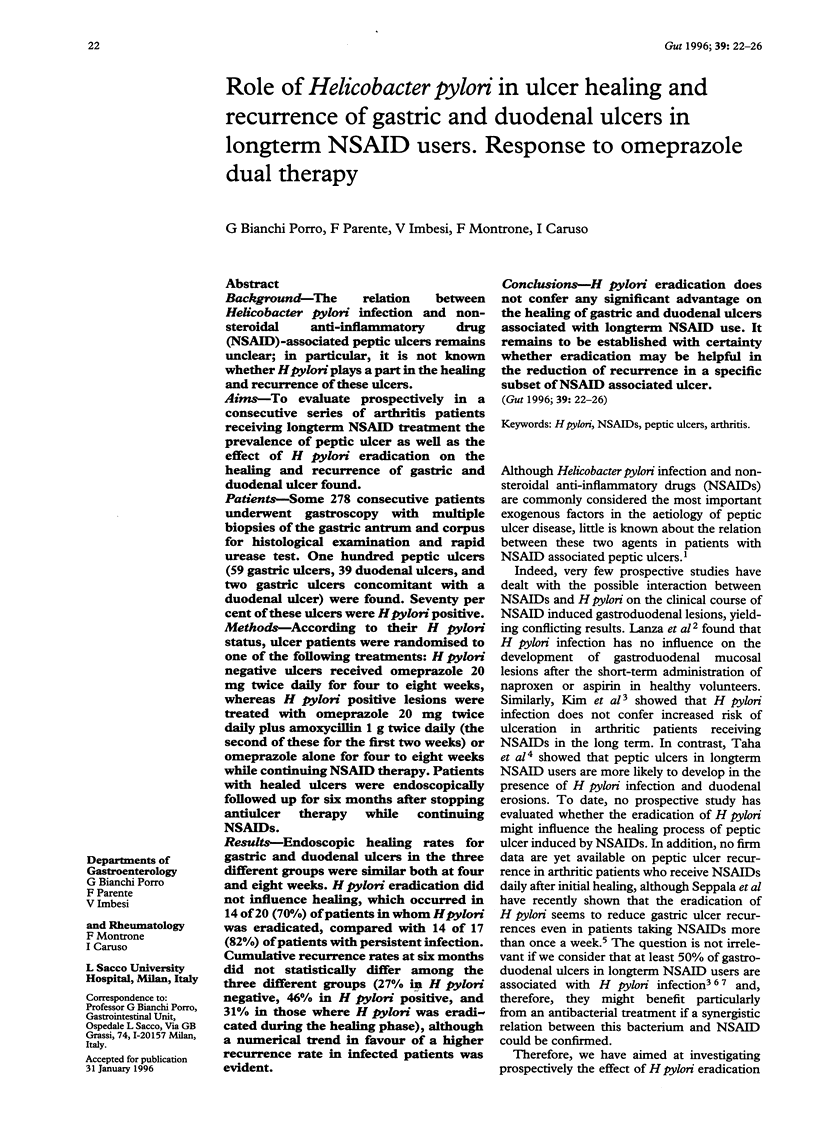
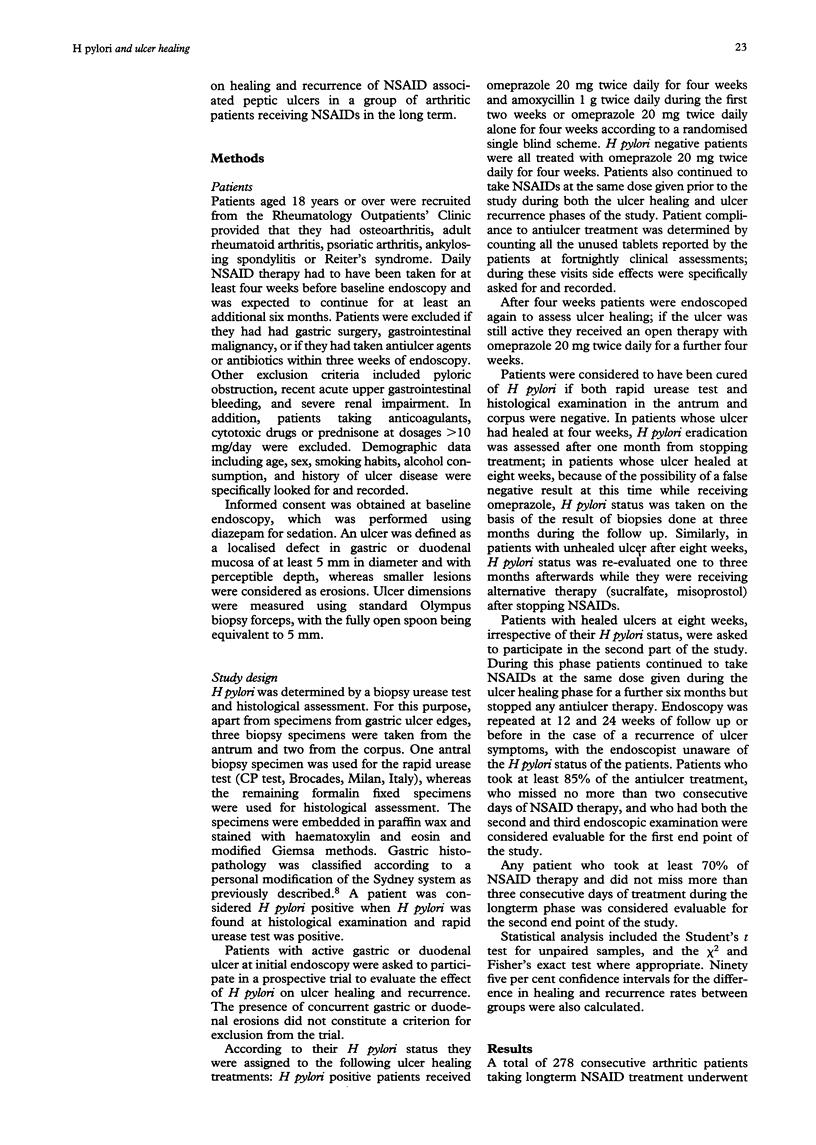
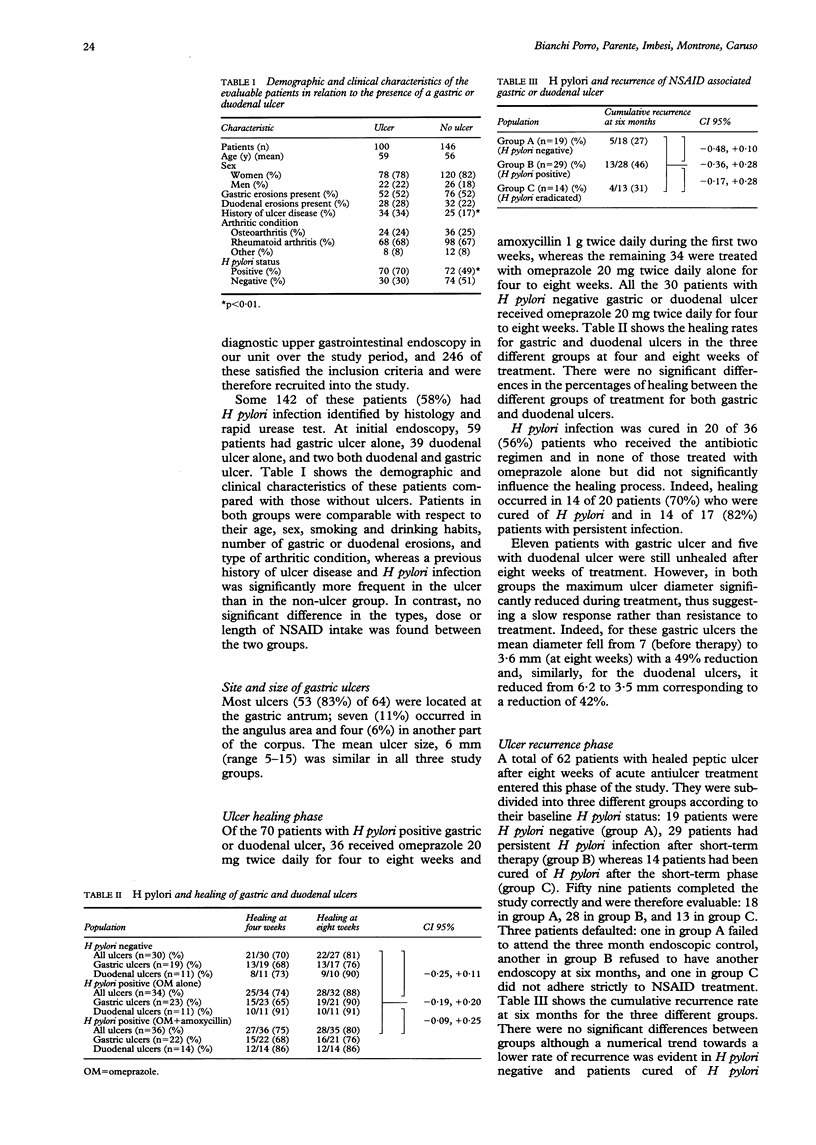
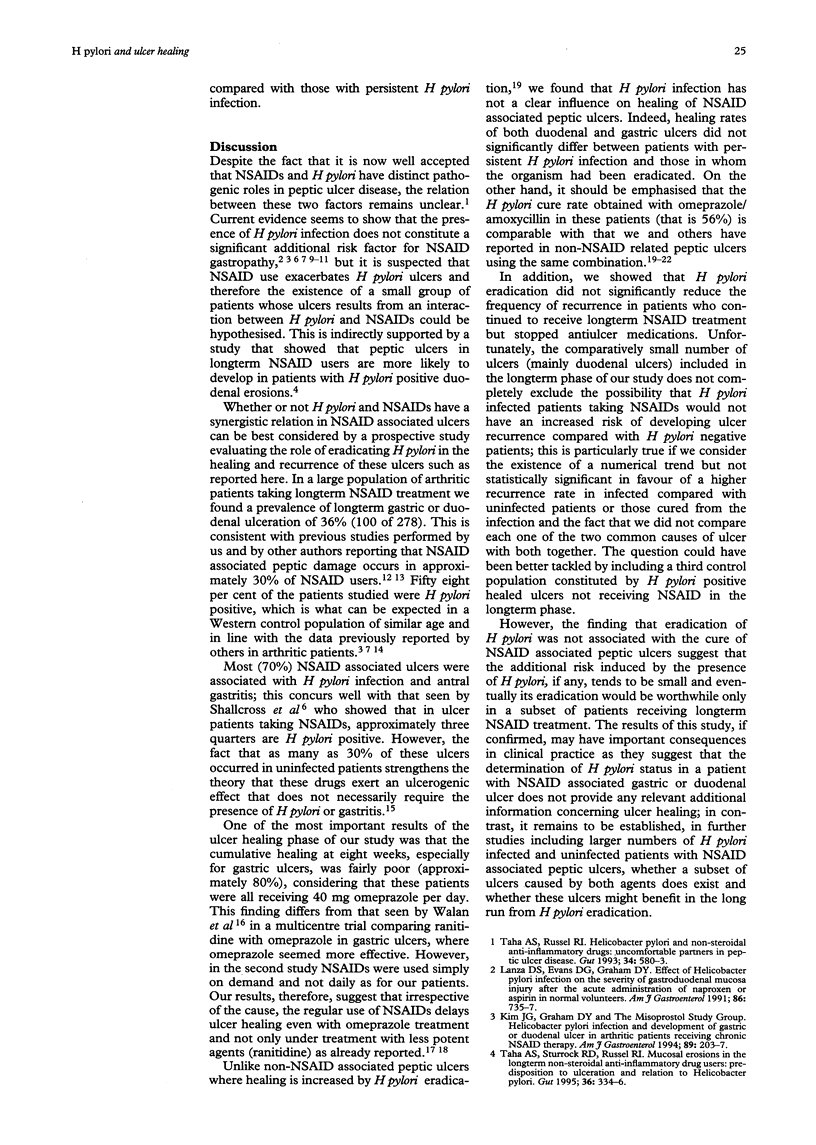
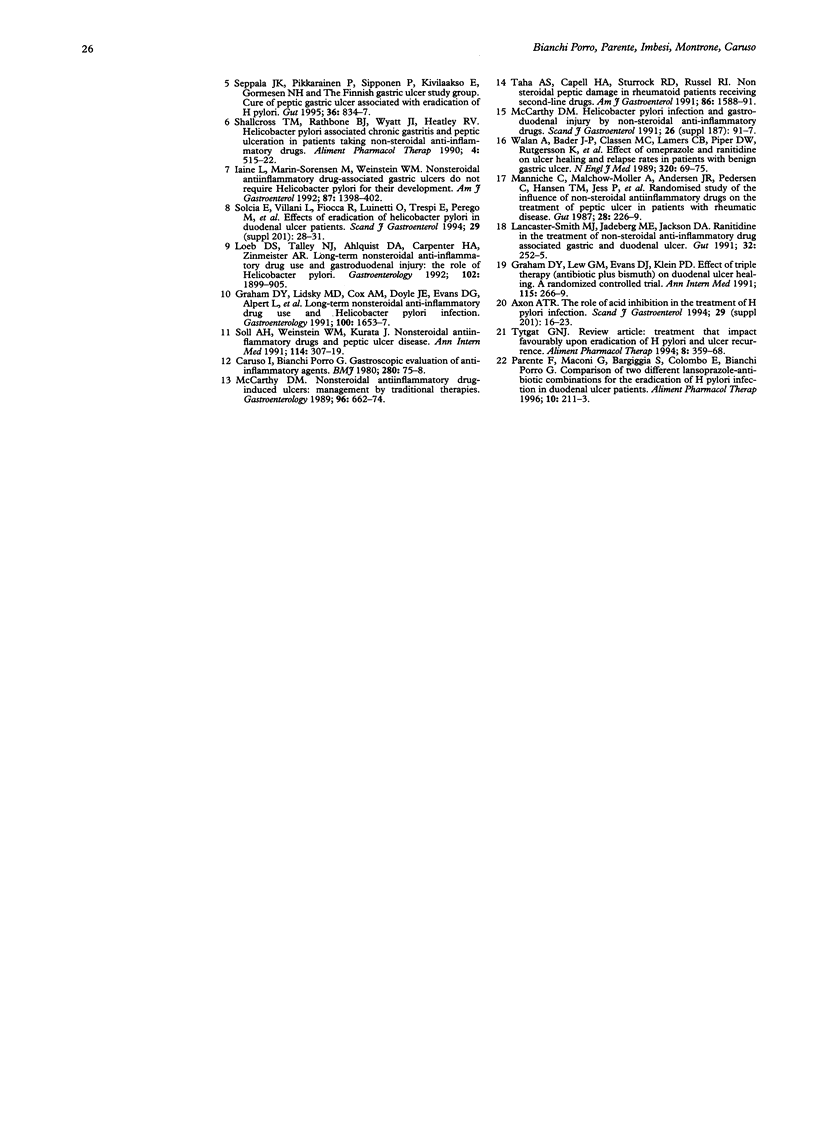
Selected References
These references are in PubMed. This may not be the complete list of references from this article.
- Axon A. T. The role of acid inhibition in the treatment of Helicobacter pylori infection. Scand J Gastroenterol Suppl. 1994;201:16–23. [PubMed] [Google Scholar]
- Caruso I., Bianchi Porro G. Gastroscopic evaluation of anti-inflammatory agents. Br Med J. 1980 Jan 12;280(6207):75–78. doi: 10.1136/bmj.280.6207.75. [DOI] [PMC free article] [PubMed] [Google Scholar]
- Graham D. Y., Lew G. M., Evans D. G., Evans D. J., Jr, Klein P. D. Effect of triple therapy (antibiotics plus bismuth) on duodenal ulcer healing. A randomized controlled trial. Ann Intern Med. 1991 Aug 15;115(4):266–269. doi: 10.7326/0003-4819-115-4-266. [DOI] [PubMed] [Google Scholar]
- Graham D. Y., Lidsky M. D., Cox A. M., Evans D. J., Jr, Evans D. G., Alpert L., Klein P. D., Sessoms S. L., Michaletz P. A., Saeed Z. A. Long-term nonsteroidal antiinflammatory drug use and Helicobacter pylori infection. Gastroenterology. 1991 Jun;100(6):1653–1657. doi: 10.1016/0016-5085(91)90665-8. [DOI] [PubMed] [Google Scholar]
- Kim J. G., Graham D. Y. Helicobacter pylori infection and development of gastric or duodenal ulcer in arthritic patients receiving chronic NSAID therapy. The Misoprostol Study Group. Am J Gastroenterol. 1994 Feb;89(2):203–207. [PubMed] [Google Scholar]
- Laine L., Marin-Sorensen M., Weinstein W. M. Nonsteroidal antiinflammatory drug-associated gastric ulcers do not require Helicobacter pylori for their development. Am J Gastroenterol. 1992 Oct;87(10):1398–1402. [PubMed] [Google Scholar]
- Lancaster-Smith M. J., Jaderberg M. E., Jackson D. A. Ranitidine in the treatment of non-steroidal anti-inflammatory drug associated gastric and duodenal ulcers. Gut. 1991 Mar;32(3):252–255. doi: 10.1136/gut.32.3.252. [DOI] [PMC free article] [PubMed] [Google Scholar]
- Lanza F. L., Evans D. G., Graham D. Y. Effect of Helicobacter pylori infection on the severity of gastroduodenal mucosal injury after the acute administration of naproxen or aspirin to normal volunteers. Am J Gastroenterol. 1991 Jun;86(6):735–737. [PubMed] [Google Scholar]
- Loeb D. S., Talley N. J., Ahlquist D. A., Carpenter H. A., Zinsmeister A. R. Long-term nonsteroidal anti-inflammatory drug use and gastroduodenal injury: the role of Helicobacter pylori. Gastroenterology. 1992 Jun;102(6):1899–1905. doi: 10.1016/0016-5085(92)90311-l. [DOI] [PubMed] [Google Scholar]
- Manniche C., Malchow-Møller A., Andersen J. R., Pedersen C., Hansen T. M., Jess P., Helleberg L., Rasmussen S. N., Tage-Jensen U., Nielsen S. E. Randomised study of the influence of non-steroidal anti-inflammatory drugs on the treatment of peptic ulcer in patients with rheumatic disease. Gut. 1987 Feb;28(2):226–229. doi: 10.1136/gut.28.2.226. [DOI] [PMC free article] [PubMed] [Google Scholar]
- McCarthy D. M. Helicobacter pylori infection and gastroduodenal injury by non-steroidal anti-inflammatory drugs. Scand J Gastroenterol Suppl. 1991;187:91–97. doi: 10.3109/00365529109098230. [DOI] [PubMed] [Google Scholar]
- McCarthy D. M. Nonsteroidal antiinflammatory drug-induced ulcers: management by traditional therapies. Gastroenterology. 1989 Feb;96(2 Pt 2 Suppl):662–674. doi: 10.1016/s0016-5085(89)80063-0. [DOI] [PubMed] [Google Scholar]
- Parente F., Maconi G., Bargiggia S., Colombo E., Bianchi Porro G. Comparison of two lansoprazole-antibiotic combinations (amoxycillin or classical triple therapy) for treatment of H. pylori infection in duodenal ulcer patients. Aliment Pharmacol Ther. 1996 Apr;10(2):211–213. doi: 10.1046/j.1365-2036.1996.729121000.x. [DOI] [PubMed] [Google Scholar]
- Seppälä K., Pikkarainen P., Sipponen P., Kivilaakso E., Gormsen M. H. Cure of peptic gastric ulcer associated with eradication of Helicobacter pylori. Finnish Gastric Ulcer Study Group. Gut. 1995 Jun;36(6):834–837. doi: 10.1136/gut.36.6.834. [DOI] [PMC free article] [PubMed] [Google Scholar]
- Shallcross T. M., Rathbone B. J., Wyatt J. I., Heatley R. V. Helicobacter pylori associated chronic gastritis and peptic ulceration in patients taking non-steroidal anti-inflammatory drugs. Aliment Pharmacol Ther. 1990 Oct;4(5):515–522. doi: 10.1111/j.1365-2036.1990.tb00498.x. [DOI] [PubMed] [Google Scholar]
- Solcia E., Villani L., Fiocca R., Luinetti O., Boldorini R., Trespi E., Perego M., Alvisi C., Lazzaroni M., Bianchi Porro G. Effects of eradication of Helicobacter pylori on gastritis in duodenal ulcer patients. Scand J Gastroenterol Suppl. 1994;201:28–34. [PubMed] [Google Scholar]
- Soll A. H., Weinstein W. M., Kurata J., McCarthy D. Nonsteroidal anti-inflammatory drugs and peptic ulcer disease. Ann Intern Med. 1991 Feb 15;114(4):307–319. doi: 10.7326/0003-4819-114-4-307. [DOI] [PubMed] [Google Scholar]
- Taha A. S., Capell H. A., Sturrock R. D., Russell R. I. Nonsteroidal peptic damage in rheumatoid patients receiving second-line drugs. Am J Gastroenterol. 1991 Nov;86(11):1588–1591. [PubMed] [Google Scholar]
- Taha A. S., Russell R. I. Helicobacter pylori and non-steroidal anti-inflammatory drugs: uncomfortable partners in peptic ulcer disease. Gut. 1993 May;34(5):580–583. doi: 10.1136/gut.34.5.580. [DOI] [PMC free article] [PubMed] [Google Scholar]
- Taha A. S., Sturrock R. D., Russell R. I. Mucosal erosions in longterm non-steroidal anti-inflammatory drug users: predisposition to ulceration and relation to Helicobacter pylori. Gut. 1995 Mar;36(3):334–336. doi: 10.1136/gut.36.3.334. [DOI] [PMC free article] [PubMed] [Google Scholar]
- Tytgat G. N. Review article: treatments that impact favourably upon the eradication of Helicobacter pylori and ulcer recurrence. Aliment Pharmacol Ther. 1994 Aug;8(4):359–368. doi: 10.1111/j.1365-2036.1994.tb00303.x. [DOI] [PubMed] [Google Scholar]
- Walan A., Bader J. P., Classen M., Lamers C. B., Piper D. W., Rutgersson K., Eriksson S. Effect of omeprazole and ranitidine on ulcer healing and relapse rates in patients with benign gastric ulcer. N Engl J Med. 1989 Jan 12;320(2):69–75. doi: 10.1056/NEJM198901123200201. [DOI] [PubMed] [Google Scholar]


